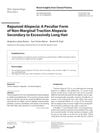
Higher levels of β-carotene and vitamin E may help prevent certain types of hair loss.
 June 2023 in “Journal of cosmetic dermatology”
June 2023 in “Journal of cosmetic dermatology” Both DPCP alone and with PRP are effective and safe for treating severe alopecia areata.
 August 2024 in “Frontiers in Public Health”
August 2024 in “Frontiers in Public Health” Alopecia Areata severely impacts mental health, causing anxiety and depression, affecting quality of life.
14 citations,
April 2017 in “Dermatology practical & conceptual” Yellow dots are common in severe alopecia areata.
 January 2023 in “Indian Dermatology Online Journal”
January 2023 in “Indian Dermatology Online Journal” Bimatoprost and clobetasol are both effective for scalp hair loss, but bimatoprost works faster, has fewer side effects, and grows more colored hair.
4 citations,
January 2023 in “Medical Journal of Babylon” Hemp seed oil shows promise in treating localized alopecia areata.
 4 citations,
October 2022 in “Genes”
4 citations,
October 2022 in “Genes” Our microbiome may affect the development of the hair loss condition Alopecia Areata, but more research is needed to understand this relationship.
1 citations,
March 2022 in “Dermatology Research and Practice” Higher CD70 and CD27 gene expression in alopecia areata lesions predicts disease severity and activity.
 June 2024 in “Skin Research and Technology”
June 2024 in “Skin Research and Technology” hsa-miR-193a-5p may help diagnose and treat alopecia areata.
 11 citations,
January 2022 in “Journal der Deutschen Dermatologischen Gesellschaft”
11 citations,
January 2022 in “Journal der Deutschen Dermatologischen Gesellschaft” Alopecia areata is a chronic condition causing hair loss, with new treatments targeting the immune system showing promise.
6 citations,
September 2022 in “Vaccines” Some people developed alopecia areata after COVID-19 vaccination, but it's not caused by the vaccine and most improved with treatment.
6 citations,
October 2021 in “Biomedical Research and Therapy” Alopecia areata patients have higher levels of IL-6 and TNF-α.
 3 citations,
August 2020 in “PubMed”
3 citations,
August 2020 in “PubMed” Platelet-rich plasma (PRP) is effective in treating various skin conditions and improving hair density, thickness, and patient satisfaction, with lower relapse rates for Alopecia Areata.
 1 citations,
January 2018 in “Indian journal of dermatopathology and diagnostic dermatology”
1 citations,
January 2018 in “Indian journal of dermatopathology and diagnostic dermatology” Trichoscopy helps diagnose and monitor hair and scalp problems without needing many biopsies.
 November 2024 in “Journal of Cosmetic Dermatology”
November 2024 in “Journal of Cosmetic Dermatology” Baricitinib is effective for severe alopecia areata but has some side effects.
 October 2024 in “Dermatologic Surgery”
October 2024 in “Dermatologic Surgery” PRP and PRF show promise for hair growth but need more research for consistent and safe use.
 January 2024 in “Skin appendage disorders”
January 2024 in “Skin appendage disorders” Using growth factors and microneedling shows promise for hair regrowth in Alopecia Areata, but more research is needed.
 September 2023 in “Medicina-lithuania”
September 2023 in “Medicina-lithuania” The study suggests that analyzing DNA can help treat hair loss, but more research is needed.
 December 2022 in “Dermatology and Therapy”
December 2022 in “Dermatology and Therapy” Alopecia areata needs more recognition and better treatment access in Latin America to improve patient care and outcomes.
 June 2022 in “Frontiers in Medicine”
June 2022 in “Frontiers in Medicine” Acupuncture and moxibustion may help treat hair loss, but more research is needed.
 January 2019 in “Journal of Dermatology and Venereology”
January 2019 in “Journal of Dermatology and Venereology” Sesame and pumpkin seed oil can effectively regrow hair in alopecia areata.
November 2022 in “Frontiers in Medicine” PRP shows promise for treating mild alopecia areata but needs more research for cicatricial alopecias.
 31 citations,
July 2017 in “Stem cell investigation”
31 citations,
July 2017 in “Stem cell investigation” Platelet-rich plasma (PRP) is a simple, cost-effective treatment that promotes hair growth and reduces hair loss, with high patient satisfaction.
9 citations,
January 2015 in “Annals of dermatology/Annals of Dermatology” Alopecia areata in elderly people is usually mild and responds well to treatment.
 3 citations,
July 2022 in “Indian journal of dermatology, venereology, and leprology”
3 citations,
July 2022 in “Indian journal of dermatology, venereology, and leprology” Patients with alopecia areata have higher oxidative stress and lower antioxidant levels.
 1 citations,
April 2023 in “Frontiers in Immunology”
1 citations,
April 2023 in “Frontiers in Immunology” New treatments for hair loss from alopecia areata may include targeting immune cells, using stem cells, balancing gut bacteria, applying fatty acids, and using JAK inhibitors.
 January 2023 in “Dermatologic Therapy”
January 2023 in “Dermatologic Therapy” Platelet-rich plasma therapy is a safe and effective treatment for alopecia areata.
 November 2023 in “Indian Dermatology Online Journal”
November 2023 in “Indian Dermatology Online Journal” Tofacitinib was effective for severe, treatment-resistant hair loss without side effects.
 2 citations,
January 2020 in “Skin appendage disorders”
2 citations,
January 2020 in “Skin appendage disorders” Long hair can cause hair loss due to constant pulling.
 1 citations,
January 1967 in “The BMJ”
1 citations,
January 1967 in “The BMJ” The document concludes that while some hair and scalp disorders can be treated, hair loss from destroyed follicles is permanent, and damaged hair can only regrow naturally.























